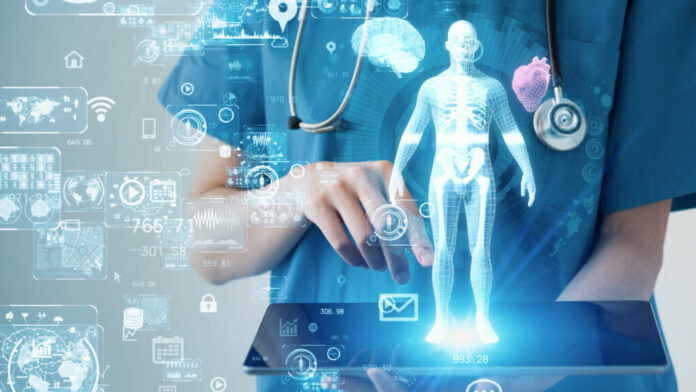In recent years, healthcare technology has undergone a remarkable transformation, revolutionizing the way patient care is delivered. From electronic health records to artificial intelligence in diagnostics, the integration of technology into healthcare has brought about significant improvements in efficiency, accuracy, and patient outcomes. This article explores various aspects of healthcare tech and how they contribute to enhancing patient care.
2. Electronic Health Records (EHRs):
Electronic Health Records have replaced traditional paper-based records, providing a comprehensive digital overview of a patient’s medical history. This section delves into the benefits of EHRs, such as improved accessibility, streamlined communication among healthcare professionals, and enhanced coordination of care.
3. Telemedicine and Remote Monitoring:
Telemedicine has emerged as a game-changer in healthcare, especially in remote or underserved areas. Discussing the advantages of telemedicine, this section also explores how remote monitoring devices help healthcare providers keep track of patients’ vital signs and chronic conditions, leading to early intervention and better disease management.
4. Wearable Devices in Healthcare:
Wearable devices, such as smartwatches and fitness trackers, have become increasingly popular. This section examines how these devices are being utilized in healthcare, from monitoring physical activity to tracking vital signs and empowering individuals to take an active role in their health.
5. Artificial Intelligence in Diagnostics:
Artificial Intelligence (AI) is making significant strides in medical diagnostics. This part explores the role of AI in interpreting medical images, diagnosing diseases, and predicting patient outcomes. It discusses the potential for faster and more accurate diagnoses, leading to timely and effective treatments.
6. Robotics in Surgery:
Robotic-assisted surgery has transformed the field of surgery, allowing for precision and minimally invasive procedures. This section explores how robotic systems enhance surgical capabilities, reduce recovery times, and improve overall patient satisfaction.
7. Virtual Reality in Rehabilitation:
Virtual Reality (VR) is being used in healthcare for therapeutic purposes, particularly in rehabilitation. Discussing the benefits of VR in physical and mental health rehabilitation, this section explores how immersive experiences can aid patients in their recovery journey.
8. Patient Engagement Apps:
Patient engagement is crucial for successful healthcare outcomes. This part delves into the role of patient engagement apps in promoting communication between patients and healthcare providers, medication adherence, and the overall management of chronic conditions.
9. Big Data Analytics in Healthcare:
The healthcare industry generates vast amounts of data, and Big Data analytics play a pivotal role in deriving meaningful insights. This section explores how data analytics contribute to personalized medicine, predictive modeling, and population health management.
10. Challenges and Considerations:
While healthcare technology offers numerous advantages, it is not without its challenges. This section discusses considerations such as data privacy, interoperability issues, and the potential for technology to exacerbate healthcare disparities.
11. Future Prospects:
Looking ahead, this section explores the future prospects of healthcare technology, including emerging technologies, potential breakthroughs, and the continued evolution of patient-centered care.
13. Introduction (Extended):
The rapid evolution of healthcare technology has become a cornerstone in reshaping the landscape of patient care. As we delve into an era marked by unprecedented technological advancements, it becomes increasingly evident that these innovations are not mere additions to the healthcare domain but rather integral components that revolutionize the entire patient experience. In this comprehensive exploration, we will unravel the multifaceted ways in which healthcare technology is driving improvements in patient care, addressing both the macro-level systemic changes and the micro-level impact on individual lives.
14. Interconnected Systems:
The synergy between different healthcare technologies is crucial for creating a seamless and integrated healthcare system. This section delves into how interconnected systems, such as the interoperability of Electronic Health Records (EHRs) with telemedicine platforms, contribute to a holistic approach in patient care. The integration of these technologies ensures that healthcare professionals have access to comprehensive patient information, fostering better-informed decision-making and ultimately enhancing patient outcomes.
15. Humanizing Technology:
While the focus is often on the technological aspects, it’s essential to emphasize how these innovations are humanizing healthcare. From personalized treatment plans derived through AI to the empathetic virtual interactions facilitated by telemedicine, this section explores how technology is not just a tool but a means to establish more compassionate and patient-centric care models.
16. Addressing Healthcare Disparities:
Healthcare disparities persist globally, with unequal access to quality care. This section delves into how healthcare technology can be a force for equity, bridging gaps in access and improving healthcare outcomes for marginalized populations. From telemedicine initiatives reaching remote areas to mobile health apps promoting health literacy, technology has the potential to address and mitigate disparities in healthcare.
17. Cybersecurity in Healthcare:
With the increasing digitization of health records and the interconnectedness of healthcare systems, the issue of cybersecurity becomes paramount. This section explores the challenges and solutions related to protecting patient data and maintaining the integrity of healthcare information systems. It emphasizes the importance of robust cybersecurity measures to ensure patient confidentiality and trust in healthcare technology.
18. Ethical Considerations in Healthcare Technology:
The integration of technology in healthcare raises ethical questions that demand careful consideration. This section explores issues such as data privacy, informed consent in AI-driven diagnostics, and the ethical use of patient information. Navigating these ethical challenges is crucial for building a healthcare system that not only leverages technology for progress but does so responsibly and ethically.
19. Global Perspectives on Healthcare Technology:
Healthcare technology is a global phenomenon, with innovations impacting healthcare delivery on a worldwide scale. This section provides a comparative analysis of how different countries and regions adopt and adopt healthcare technology. It explores cultural considerations, regulatory frameworks, and the role of technology in addressing global health challenges.
20. Patient Empowerment and Informed Decision-Making:
Empowering patients with information is a cornerstone of modern healthcare. This section discusses how healthcare technology facilitates patient education, engagement, and shared decision-making. From mobile apps providing health information to virtual reality simulations explaining medical procedures, technology empowers patients to actively participate in their care journey.
21. The Role of Telehealth Beyond Consultations:
Telehealth extends beyond virtual consultations. This section explores the diverse applications of telehealth, including its role in mental health support, chronic disease management, and preventive care. It emphasizes how the versatility of telehealth contributes to a more comprehensive and proactive approach to patient care.
22. Personalized Medicine and Genomic Technologies:
Advancements in genomic technologies have paved the way for personalized medicine, tailoring treatments to an individual’s genetic makeup. This section explores how genomics and personalized medicine are revolutionizing disease prevention, diagnosis, and treatment, ushering in a new era of precision healthcare.
23. Collaborative Healthcare Models:
Technology is not only transforming the relationship between patients and healthcare providers but also fostering collaborative models of care. This section discusses how collaborative platforms and tools enable interdisciplinary healthcare teams to work cohesively, ensuring a holistic approach to patient well-being.
Conclusion:
In conclusion, healthcare technology has become an integral part of modern healthcare systems, fundamentally transforming the way patient care is delivered. From electronic health records to robotic surgery and beyond, the integration of technology has ushered in a new era of improved efficiency, accuracy, and patient outcomes. As we continue to advance in the realm of healthcare technology, the potential for further enhancements in patient care is limitless, promising a future where technology and compassionate care work hand in hand for the betterment of global health.












